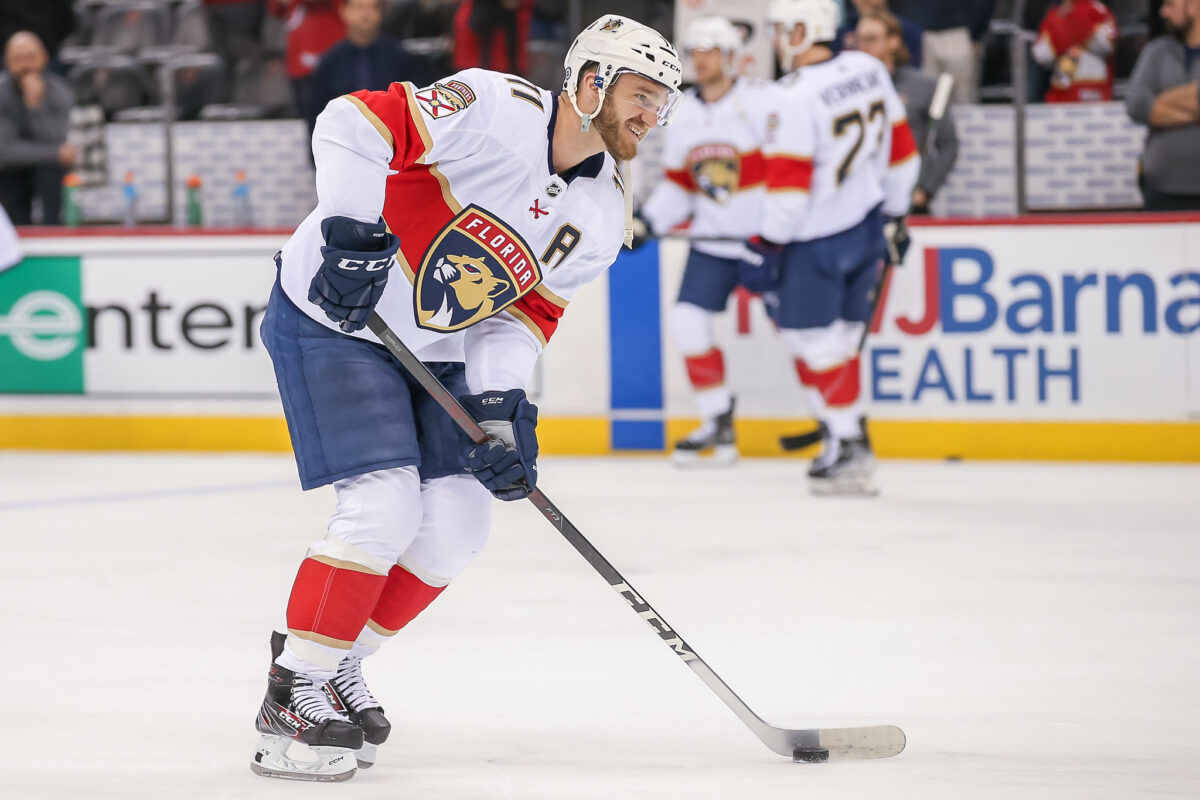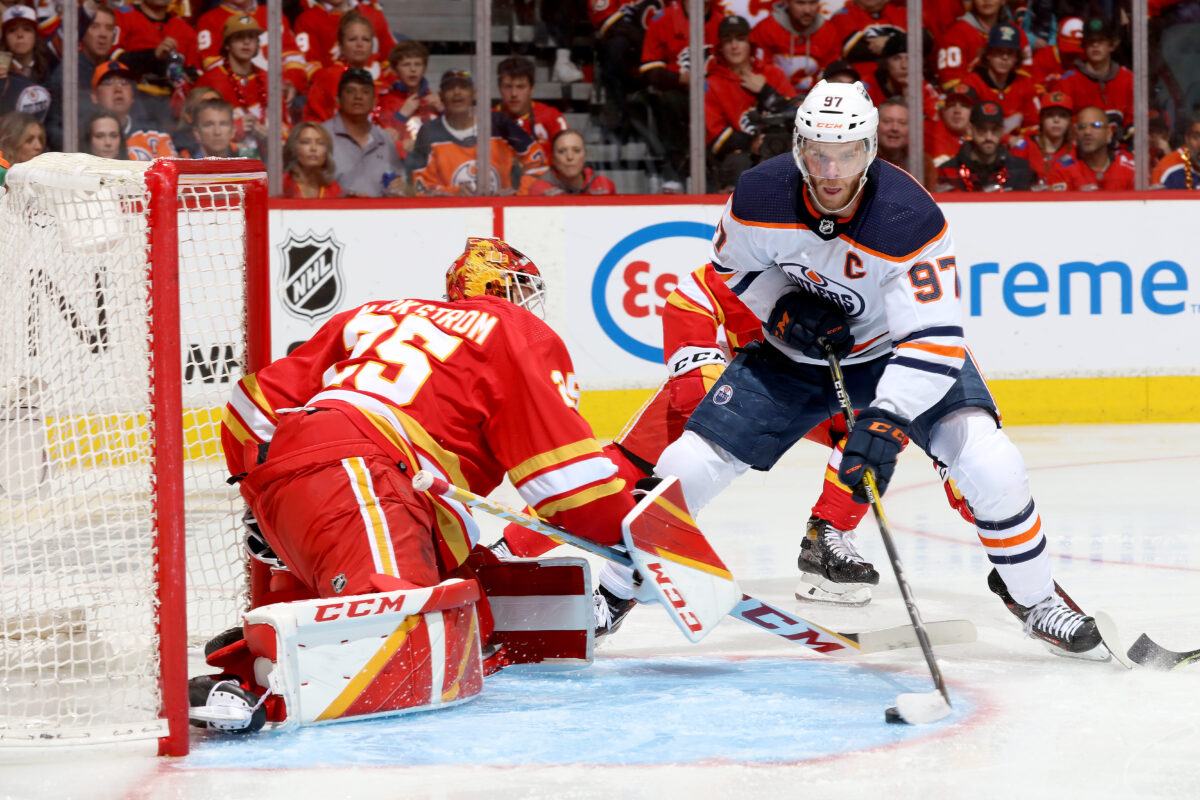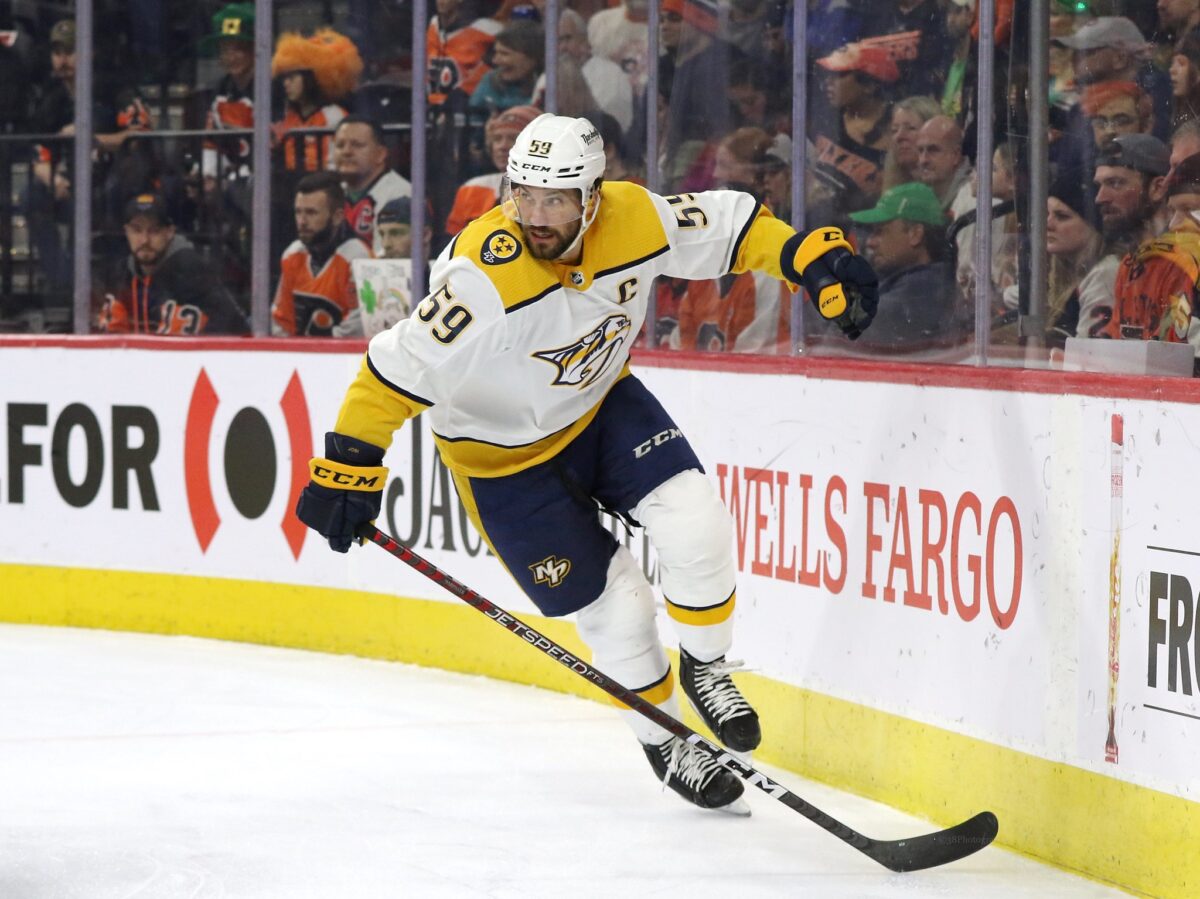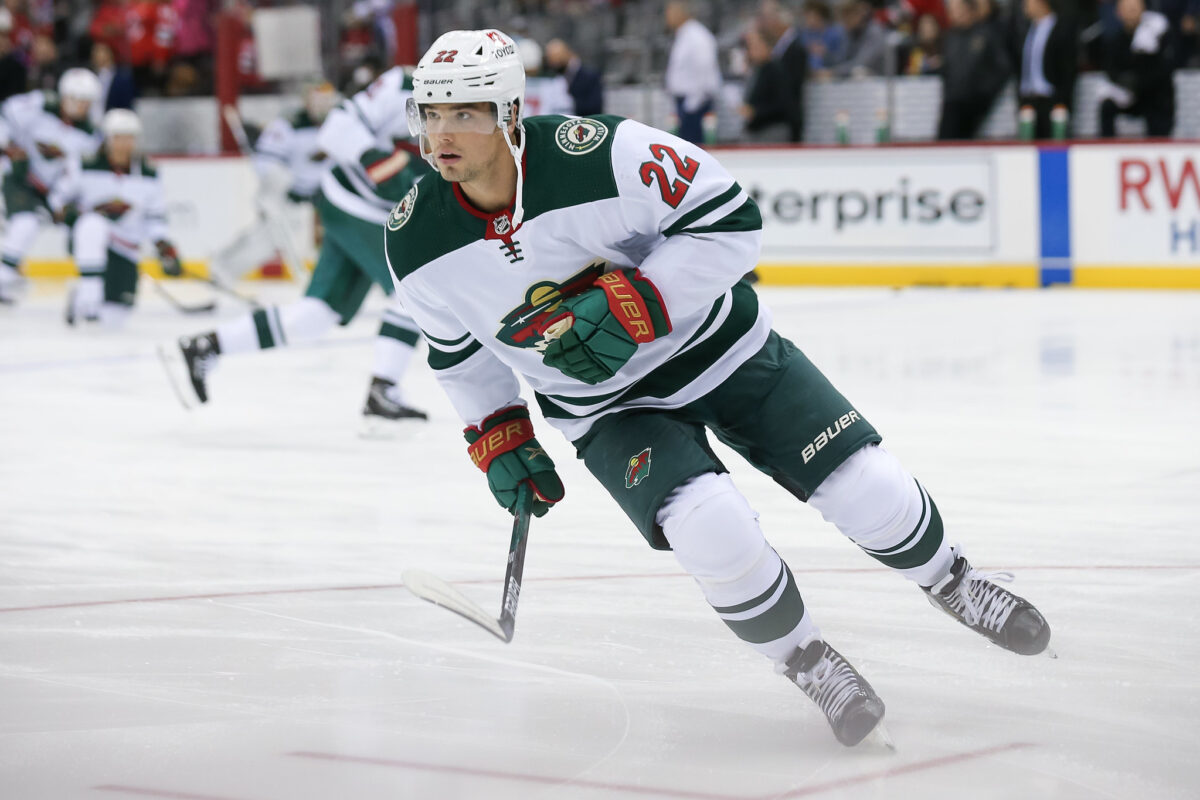With the Colorado Avalanche defeating the Tampa Bay Lightning in the Stanley Cup Final, the 2022 NHL Playoffs officially draw to a close. Although several players enjoyed breakout postseason campaigns, just as many fell short of heightened expectations stemming from exceptional regular-season showings. From stunted offensive juggernauts to suddenly mortal netminders, let’s dig into five of the most disappointing players of the 2022 Stanley Cup Playoffs.
Jonathan Huberdeau, Florida Panthers
For Jonathan Huberdeau and the Florida Panthers, the 2022 Playoffs went about as poorly as possible. After the Presidents’ Trophy-winning Panthers struggled to dispatch the aging Washington Capitals, they were unceremoniously swept by their intrastate rivals in the Lightning in the second round, scoring a meagre three goals over four games.
Huberdeau — who at one point garnered Hart Trophy buzz — followed up a 30-goal, 115-point regular season in which he tied for second in league scoring with a pedestrian postseason total of five points in 10 games. Florida’s abruptly stagnant offence isn’t all on him (Aleksandar Barkov, Sam Reinhart, and Anthony Duclair combined for six goals), but as the face of the NHL’s most prolific attack (4.15 goals per game), he shoulders most of the blame.

Most notably, the Panthers’ potent power play (fifth in efficiency) ran cold in the playoffs, converting on only one of 31 total opportunities. That the team’s maestro on the man-advantage (Huberdeau’s 38 power-play points ranked third in the NHL) failed to produce anywhere near that level directly led to their downfall. Now, falling to a modern-day dynasty shouldn’t be a source of great shame and Huberdeau’s teammates vanished as well, but the 29-year-old is the straw that stirs Florida’s proverbial drink. As he goes, so do the Panthers.
As the owners of the second-best regular-season points percentage (PTS%) over the past three seasons, the Panthers are still among the NHL’s elite squads heading into the offseason. However, diversifying the team’s offensive strategy is a crucial step that must be taken to achieve more favourable postseason results. The Avalanche proved that a game plan predicated on a high-octane attack can deliver a championship, but compromises can be made without sacrificing a team’s identity.
Jacob Markstrom, Calgary Flames
Jacob Markstrom and the Calgary Flames headed into the 2022 Playoffs with considerable expectations, topping the Pacific Division and finishing third in the Western Conference. After the second-best (by PTS%) regular season in franchise history and with the NHL’s playoff structure keeping the juggernaut Avalanche at bay until at least the Conference Final, expectations were sky-high. Unfortunately for both team and player, the Swedish netminder experienced a Jekyll and Hyde postseason in the truest sense of the phrase.
The 2021-22 Vezina Trophy finalist was the foundation for a stout defensive unit, finishing third in the league with a .922 save percentage (SV%) and the sixth-highest total of goals saved above expected (GSAx) (minimum 10 games played). A dominant possession team fashioned in the mould of head coach Darryl Sutter’s greatest teams backstopped by a goalie playing the most inspired hockey of his career boded well for the Stanley Cup hopefuls.

Both Markstrom and Flames got off to a solid, if uncertain start by conquering the stubborn Dallas Stars in seven tightly contested games, nearly beaten by Dominik Hasek-reincarnate in Jake Oettinger. The 32-year-old goaltender posted a sparkling .943 SV% and a plus-6.16 GSAx, outdueling his young American counterpart in the opposing crease. That victory set up a widely-anticipated clash against the Edmonton Oilers, the first playoff edition of the Battle of Alberta since 1991.
Despite finishing seven points ahead of their provincial rivals, the Flames succumbed to Connor McDavid and company in five underwhelming games while being outscored 24-19 in all situations. In contrast to his superhuman performance in the first round, Markstrom struggled immensely to keep the Oilers at bay. He posted a miserable .852 SV% for the series, and allowed nearly eight more goals than expected, finishing in the red for the playoffs as a whole. Of course, much of the Flames’ roster underperformed in their second-round tilt, but the veteran netminder had the most high-profile meltdown, and a postseason that began with so much promise concluded in infamy.
John Klingberg, Dallas Stars
Although he’s still set to test the open market as one of the most desirable free-agent defensemen, Stars blueliner John Klingberg cost himself a not-insignificant amount of salary and term with his dismal performance in the 2022 Playoffs. Of the 78 defence pairs to have played at least 30 minutes together at 5v5, Klingberg and Joel Hanley graded out among the worst in terms of their share of shots (74th), scoring chances (60th), and expected goals (58th). The Stars outscored the Flames 2-0 with the duo on the ice, but that ledger is almost entirely due to the efforts of Oettinger, who posted the 11th-highest playoff GSAx of the analytics era (since 2007-08) despite playing in only seven games.
You may also like:
- Oilers’ Great Farm System Growing Even Stronger
- NHL Rumors: Islanders, Oilers, Capitals, Canucks
- 3 Most Probable Teams to Sign Anton Stralman
- No Good Reason for Canadiens to Rush Slafkovsky to NHL
- Maple Leafs’ 2022 Offseason Trade Targets: Seattle Kraken
The Swedish rearguard makes his bones primarily as an offensive stalwart and produced a stat line of 47 points in 74 games during the regular season, finishing 16th in powerplay scoring at his position (20 points). Despite his reputation and the need for a new contract looming in the background, the 29-year-old defender saw his offence be extinguished by a suffocating Flames squad, posting a solitary assist in seven games. Further, his shot rate in all situations was halved, going from 5.08 shots per 60 minutes in the regular season to a measly 2.26 per 60 in the postseason.
Fortunately for Klingberg, hulking, offensively-gifted defensemen (he stands at 6-foot-3) are not readily available in free agency. It’s also no secret that former Stars head coach Rick Bowness did not effectively leverage his strengths in a stingy, defence-first system, so a change of scenery could help him reach 2017-18 levels when he scored 67 points in 82 games. Even with a sorely underwhelming playoff outing, Klingberg should garner a healthy raise on the $4.25 million he earned against the cap this past season. Still, a strong postseason showing would have gone a long way to padding his bank account.
Roman Josi, Nashville Predators
Some might find Roman Josi‘s inclusion on this list somewhat contentious, given that the 16th-ranked Nashville Predators lined up against the eventual Stanley Cup champion Avalanche in the first round. Yet, his uncharacteristically subpar play was a far cry from the spectacular regular season which made him a finalist for the Norris Trophy. His 96 points on the season were the 19th-highest tally by a defenseman in the NHL’s modern era (post-1967), and the most at his position since Phil Housley scored 97 during the 1992-93 season. More than two points in four games are expected of such a dynamic star, even if he faced arguably the best playoff team of the cap era.
According to Corey Sznajder’s tracking data, Josi generated 12.5 shots (19th among defensemen) and 9.4 primary shot assists (fifth) per 60 minutes during the regular season at 5v5. He shouldered much of the offensive workload for a surprising, but still limited Predators squad that hasn’t advanced past the first round since 2018. Unsurprisingly, those rates tumbled against the Avalanche’s voracious forechecking strategy, with Nashville’s supporting cast failing to carry its weight.

Although he completed the most controlled (i.e. with possession) zone entries per 60 among defensemen in the playoffs by a wide margin, and took nearly four more shots per 60, Josi’s shot assist rate cratered to a scant 2.88 per 60. Colorado conceded the blue line, but successfully obstructed potential passing lanes so that he had little recourse but to launch harmless attempts on goal.
Again, Josi shouldn’t be too heavily penalized for failing to solve a dominant team hitting its stride at the perfect time, but more should be expected of a player being compared favourably to the NHL’s best all-time attacking rearguards.
Kevin Fiala, Minnesota Wild
Following the common thread running through those listed, Kevin Fiala is another example in a long line of players who matched, or even exceeded career-highs in the 2021-22 season, but disappointed come playoff time. The Minnesota Wild winger seemed to finally deliver on the potential which made him the 11th-overall selection in the 2014 NHL Entry Draft, scoring 85 points (33 goals) in 82 games this season.
Like many of his Wild teammates, Fiala struggled to recreate his regular-season magic, only tallying three assists in a six-game first-round loss to the St. Louis Blues. The Swiss forward experienced a noticeable dip in his shot- and chance-generation, going from 10.57 shots and 10.7 chances per 60 in the regular season to 8.53 shots and 7.39 chances per 60 in the postseason. The Wild lacked the offensive impetus to close out the series after taking a 2-1 lead, scoring five goals over the final three losses. It’s unfair to pin all of the blame on Fiala, but he’s demonstrated he can offer more in the past.

Despite rumours of a rift with coaches in Minnesota (from ‘Jared Spurgeon injured in loss to Florida, and it’s worth paying attention to the brewing Kevin Fiala situation’ – Michael Russo, The Athletic,11/20/21), the 25-year-old should entice no shortage of suitors for if general manager Bill Guerin seriously pursues a trade. Even after struggling in two consecutive postseasons (five points in 13 games), the emerging star ranks 32nd in NHL scoring since 2019-20, making him an intriguing target for organizations on the rise.
2022 Stanley Cup Playoffs Full of Disappointing Performances
The nature of the playoffs dictates that only one team emerges victorious, leaving a trail of disappointment in its wake. For the players included on this list and others fortunate enough to escape more targeted criticism, the 2022-23 season is a welcome opportunity for redemption. The beautiful thing about sports is that (say it with me) there’s always next year, and that adage still rings as true as ever.
Dishonourable Mentions: Ville Husso (St. Louis Blues); Ben Chiarot (Florida Panthers); MacKenzie Weegar (Florida Panthers); Ryan Strome (New York Rangers); Alex Killorn (Tampa Bay Lightning)
Data courtesy of AllThreeZones, Evolving Hockey, Hockey Reference, and Natural Stat Trick.
